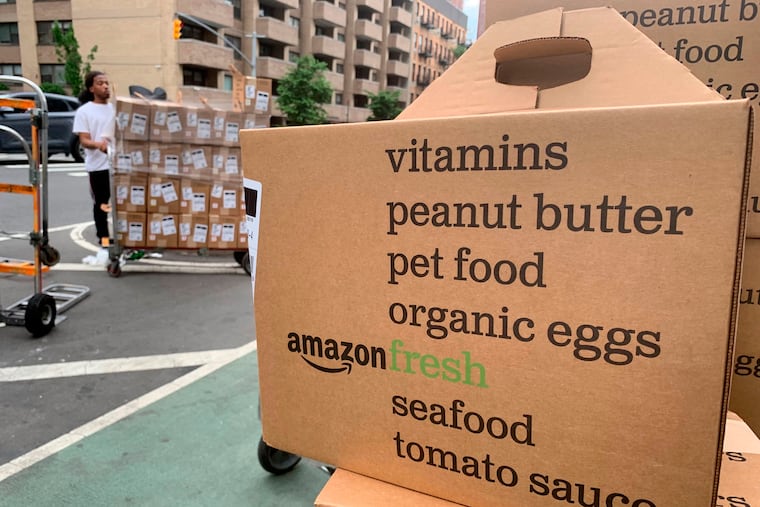As grocery deliveries surge due to the coronavirus, the most vulnerable have to wait
Normally, only about 3% of all grocery spending in the United States is done online. But as the coronavirus pandemic intensifies, online delivery services have become overwhelmed, with weeks-long wait times.

If Shannon Locher had to walk into a grocery store right now, she might have a panic attack.
The 33-year-old Newtown Square woman has cystic fibrosis, a genetic disease that limits lung function. A few months ago, her doctor was about to put her on the list for a double lung transplant, Locher said, but then a new treatment improved her lung function to 40%. Now she’s worried about the coronavirus, which can lead to severe respiratory problems.
“I’m in the position where I really cannot get this,” she said. She last went to the grocery store more than two weeks ago, she said, and has since used online grocery shopping for herself, her husband, and her two young children.
» READ MORE: What you need to know about buying food (and booze) during the shutdown
But it’s become increasingly difficult, she said, as delivery time slots are being reserved weeks in advance and stores’ stock fluctuates.
In a normal time, when a global pandemic isn’t turning life upside down, only about 3% of grocery spending is done online. People often want to pick out their own produce and meats, and don’t find the in-person shopping process too taxing.
» READ MORE: Grocery store workers are suddenly on the front lines in the coronavirus outbreak, and they’re anxious
But now, people are anxious about any human interaction. As the coronavirus outbreak intensifies, hundreds of millions of Americans have been told to stay home. In Pennsylvania, Gov. Tom Wolf described his order this way to residents of Philadelphia and its suburbs: “Don’t leave your home unless someone’s life depends on your leaving. Because ultimately, someone’s life does depend on you staying home."
Already at a greater risk of developing lung infections, Locher is one of the many people whose lives depend on social distancing.
Under stay-at-home orders, residents are allowed to pick up groceries, take-out food, and other essentials. Experts say healthy people are generally safe to go to the grocery store as long as they take precautions and keep a safe distance from others.
» READ MORE: Is the grocery store even safe? In Philly region, it’s improving, but there are additional steps you can take.
But seniors and those with underlying health conditions have more reason to worry about exposure to the coronavirus, since they have a higher chance of being hospitalized or suffering complications if they get sick.
Contactless grocery and restaurant delivery is a safer alternative to in-person shopping, experts say, since food itself is unlikely to be a vector, even if prepared by someone who has the virus.
Grocery delivery services are trying their best to meet the new demand while taking safety precautions. But it’s been a struggle.
Customers who try to order from Peapod, which runs Giant’s delivery service, are greeted with a service update notifying them that delivery and pickup time slots are “extremely limited” due to “unprecedented demand," and product availability is limited. On Friday morning, all time slots were reserved through April 8.
The website of FreshDirect, a New York-based grocer, says it’s experiencing “very high demand." In the Philadelphia area, all delivery time slots were booked for the next week. Last week, a FreshDirect warehouse employee, who was not involved in food preparation or delivery, tested positive for the coronavirus.
Amazon, which owns Whole Foods and runs its delivery service, is also seeing backups.
“We’ve seen an increase in people shopping online, and are working with suppliers and distributors to ensure we’re getting products customers need," a spokesperson said in a statement. "We are also hiring over 100,000 positions across the U.S., including for grocery delivery, enabling us to add delivery windows and get grocery orders to customers quickly.”
Senior citizens find themselves in a bind, too. One home health-care worker said his senior clients can’t get essential items, including groceries and personal products, delivered. At the same time, he said, they worry about caregivers or relatives making an extra trip to a store, just one more place they could contract the virus.
» READ MORE: ‘We don’t have a plan’: Coronavirus adds pressure to caregivers sandwiched between seniors and kids
On Friday, Locher’s husband, Tom, picked up an order from Giant. Given the delivery backup, it was their only option to restock quickly. He went alone in his truck, she said, so packages could be placed in the bed without human interaction.
They wipe down all their groceries, she said, and don’t buy any produce or other items they can’t sanitize from the outside. As Locher explained the unloading process, she paused.
“It sounds so crazy. It sounds insane,” she said. “But we have to do this.”
Despite all this stress around something as mundane as grocery shopping, Locher said she doesn’t resent healthy people for turning to online services, too.
“I know everybody is doing the best they can,” she said. “Everybody is nervous and scared about this.”